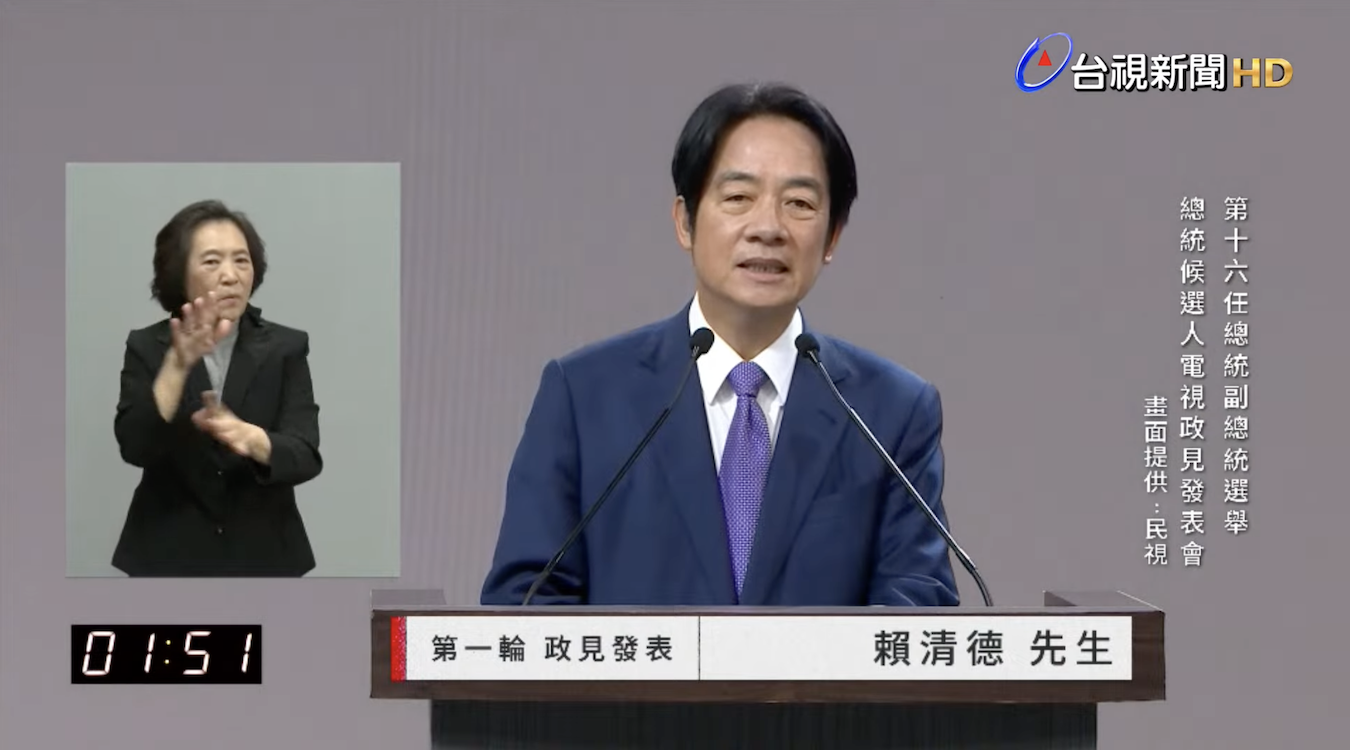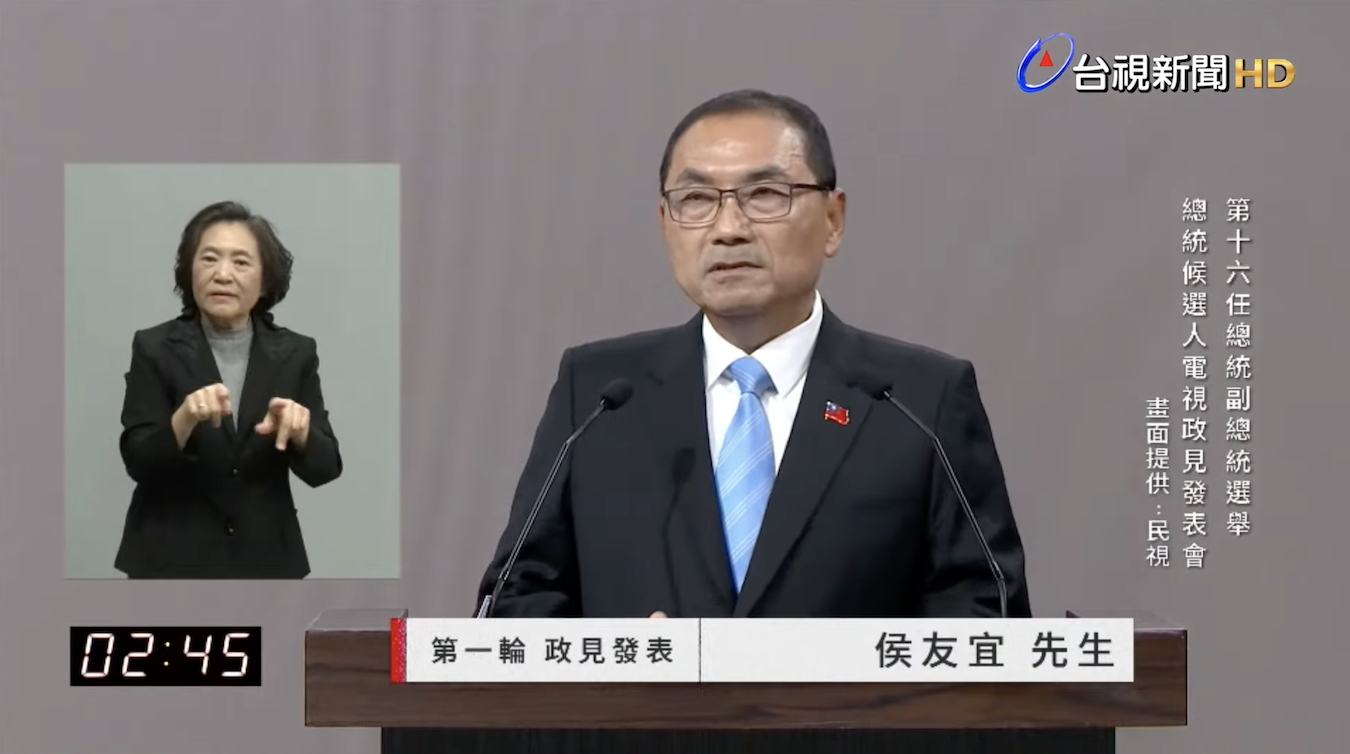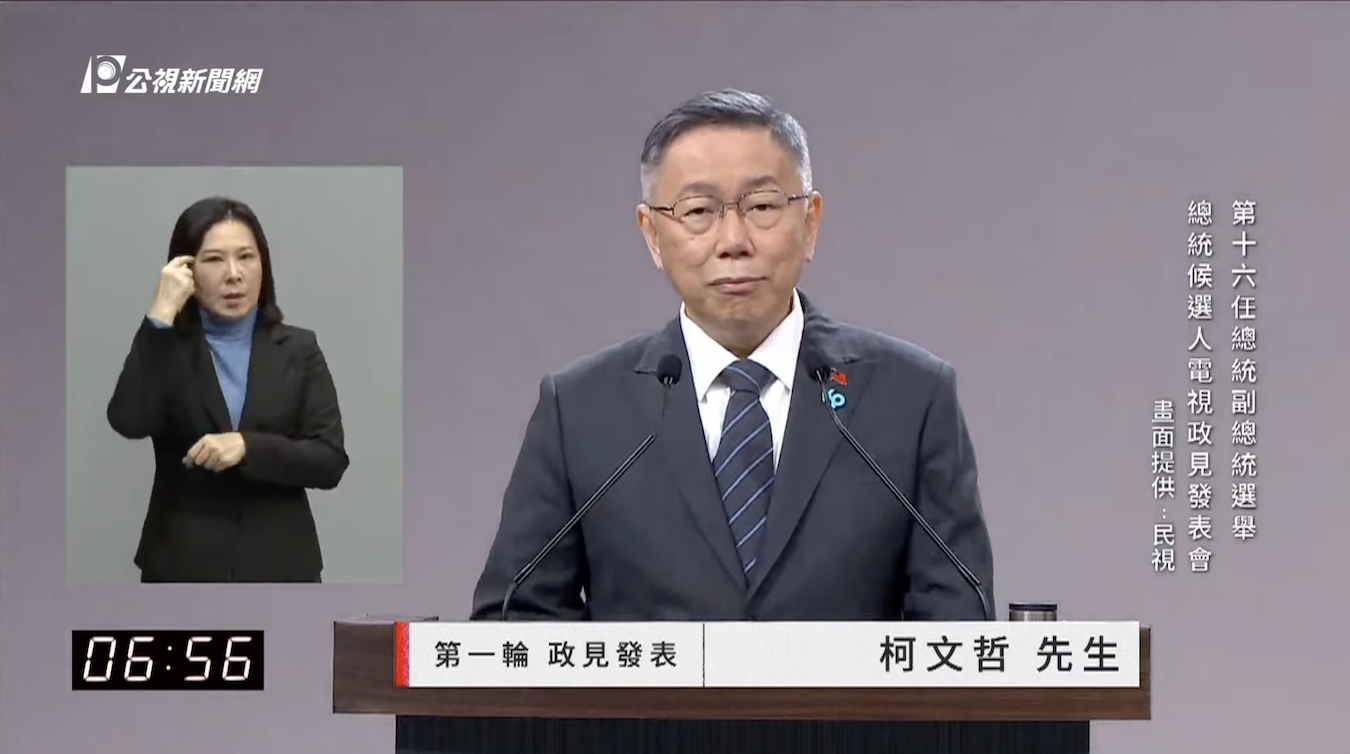by Brian Hioe
語言:
English
Photo Credit: PTS/Screenshot
THE FIRST PRESIDENTIAL policy presentation took place on December 20th. The format is not strictly a debate, as it offers more limited opportunities for exchanges between presidential candidates. Nevertheless, it usually amounts to a de facto debate, and candidates usually do attack each other in the course of the policy presentation.
The order of the candidates for the policy presentation was KMT presidential candidate Hou You-yi, followed by DPP presidential candidate Lai Ching-te, then TPP presidential candidate Ko Wen-je. Relatively few surprises emerged from the debate, which had no clear frontrunners.
In the opening round, Hou You-yi criticized the DPP on highly partisan grounds, suggesting that the DPP had become an authoritarian party. Hou lashed out at the DPP’s efforts at transitional justice, framing this as political persecution. Hou further attacked the DPP for corruption, accusing it of graft in Taiwan’s COVID-19 response. Hou then went on to attack Lai’s past history of support for Taiwanese independence, while stating that he would build peace through exchanges with China that nonetheless protected Taiwan’s sovereignty, stressing that he opposed Taiwanese independence but also One Country, Two Systems, claiming that the ROC constitution was the “sacred mountain” for maintaining peace and that the election was a choice between war and peace.
 DPP presidential candidate Lai Ching-te. Photo credit: TTS/Screenshot
DPP presidential candidate Lai Ching-te. Photo credit: TTS/Screenshot
Lai, who included Cantonese in the languages he began his greetings with, responded by criticizing his opponents for using ad hominem attacks on him and positively citing Taiwan’s history of development, linking that to the DPP’s history as emerging from the democracy movement and present military threats against Taiwan from the Chinese government. Lai attacked the KMT as already accepting China’s views regarding the “One China Principle” as part of the 1992 Consensus, framing this as equivalent to One Country, Two Systems, and suggesting that the KMT was following Tsai Ing-wen’s foreign policy. Lai stressed policies to strengthen the economy in terms of self-reliance and military reform, developing renewable energies, and building up infrastructure, while negatively citing Hong Kong as an example of what would befall Taiwan if it pursued closer relations with China.
Third, Ko sought to convey himself as a moderate in his comments. Ko began by bringing up issues facing young people regarding unaffordable housing and low salaries, and that he hoped for a unified Taiwan free of conflict between the pan-Blue and pan-Green camps. Ko framed the history of Taiwan in terms curiously resembling the pan-Green view of Taiwanese history as consisting of a number of overlapping colonialisms, while doubling down on a pro-status quo position, but stating he was open to dialogue with China and citing his achievements in that regard, and framing his policies as a program of reform.
In the second round, Hou began by responding to Lai’s previous comments, again reiterating that he opposed both Taiwanese independence and One Country, Two Systems. Hou suggested that the Tsai administration had failed to do enough for young people, particularly with regard to the slow rate of construction of social housing and failure to resolve low salaries and unaffordable housing, touting KMT policies such as open data registration of housing prices and speeding up the construction of social housing. Much of Hou’s comments were in Taiwanese.
 Hou You-yi. Photo credit: TTS/Screenshot
Hou You-yi. Photo credit: TTS/Screenshot
Lai responded to Hou by commenting that the PRC would never accept the sovereignty of the ROC. Lai then attacked Hou for his own failures to build social housing in New Taipei, which he is mayor of, and suggesting that Hou does not know the suffering of southern Taiwan, in spite of that ironically Lai hails from New Taipei and Hou is from Chiayi. Lai touted the DPP’s legislative slate as proof of the DPP’s commitment to protecting Taiwanese democracy from Chinese threats. Lai stated that there were places where the DPP had failed or had issues with corruption, but that the DPP was cleared of charges in the cases that Hou cited in his comments, while then redirecting attention to KMT legislator Ma Wen-chun being accused of leaking military secrets to China and South Korea, and citing international assessments of Taiwan as ranking high in transparency. Lai then went on to attack Ko for framing himself as fighting corruption when Taipei had seen issues with corruption grow during his mayorship. Lastly, when it came to attacks by the pan-Blue camp over a home owned by Lai accused of being an illegal structure, Lai emphasized that the structure was owned by his parents and was due to his father’s background as a miner, expressing a willingness to donate the building to commemorate the history of Taiwanese mining.
Ko opened in the second round by raising the question of what kind of Taiwan would be left to the next generation. Ko criticized the Tsai administration as hoarding resources during the COVID-19 pandemic rather than distributing it to local governments, suggesting possible corruption. Ko compared Taiwan to other countries with a similar GDP and stated that he would enact reforms regarding Taiwan’s low salaries, while stressing the program of changes he called for, and stating that he would fight growing issues regarding fraud.
In the last round, Hou lashed out at the DPP’s accusations regarding fake news, criticizing Puma Shen in particular, among the DPP’s top party list candidates, and touted his record as New Taipei mayor. Hou attacked the DPP on energy policy with regard to the DPP’s hesitancy on nuclear power and framed this as unable to resolve Taiwan’s energy needs. Hou suggested the DPP’s interest in green energy was only because of the DPP’s investments in the green energy industry.
Lai responded by stating that Hou’s comments had little basis. Lai stated that Hou had changed position on nuclear energy between as mayor of New Taipei and KMT presidential candidate and that KMT politicians, too, were linked to green energy companies. Lai touted the fiscal and economic accomplishments of the Tsai administration. Lai criticized Ko’s calls for shifting to a cabinet-style system as incorrect, in referring to aspects of a political system that do not actually exist in a cabinet-style system. Lai then attacked the KMT and TPP’s failed alliance as reflecting how the two parties stand for their own interests and not that of the people. To this extent, Lai commented that all of the candidates would be viewed by China as pro-independence and stated that China had been threatening Taiwan before any of them were born.
 Ko Wen-je. Photo credit: TTS/Screenshot
Ko Wen-je. Photo credit: TTS/Screenshot
As for Ko, Ko began by emphasizing issues regarding housing justice in Taiwan, while suggesting the Tsai administration had failed young people. Ko again stressed the need for building social housing, while also stating that he hoped to focus on industrial development for Taiwan. Ko stated that he would simplify processes for building social housing and stressed his accomplishments as Taipei mayor. Ko then criticized candidates of both parties as only taking action on the issue near elections.
From the debate, one can see that the KMT and DPP mostly focused fire on each other in terms of cross-strait relations. Relatively few surprises were to be found in their exchanges along these lines, though Lai’s angle of attack suggesting that the KMT seemed to be mimicking the Tsai administration’s policies was new.
By contrast, Ko focused on appeals to young people, while avoiding partisan attacks on either the KMT or DPP–nevertheless, the DPP was the object of most of his attacks, as the incumbent. Ko also studiously avoided introducing the aspect of cross-strait politics into his statements, given that this is a point of vulnerability for him among his support base of young people in light of his support of the CSSTA and building a bridge between Kinmen and Mazu, and echoing a pan-Green view of Taiwan’s history. Still, Ko at one point called on his young supporters to encourage their older relatives to vote for him, suggesting lack of support among older voters is still a point of vulnerability for him. Ko currently lags in the polls, even if his TPP may be in a position to be “kingmaker” in the legislature if neither the DPP or KMT form a clear majority.

